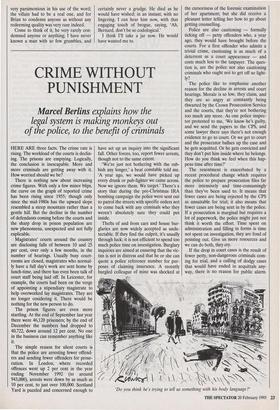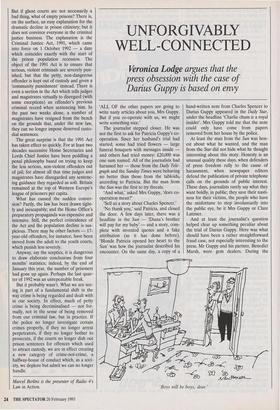CRIME WITHOUT PUNISHMENT
Marcel Berlins explains how the
legal system is making monkeys out of the police, to the benefit of criminals
HERE ARE three facts. The crime rate is rising. The workload of the courts is declin- ing. The prisons are emptying. Logically, the conclusion is inescapable. More and more criminals are getting away with it. How worried should we be?
There is nothing new about increasing crime figures. With only a few minor blips, the curve on the graph of reported crime has been rising since 1955; though only since the mid-1980s has the upward slope resembled a steep mountain rather than a gentle hill. But the decline in the number of defendants coming before the courts and the sharp drop in prison population are new phenomena, unexpected and not fully explicable.
Magistrates' courts around the country are disclosing falls of between 10 and 25 per cent, over only a few months, in the number of hearings. Usually busy court- rooms are closed, magistrates who normal- ly have a full day's work are sent home by lunch-time, and there has even been talk of court staff being laid off. In Leicester, for example, the courts had been on the verge of appointing a stipendiary magistrate to help overworked lay magistrates. They are no longer cosidering it. There would be nothing for the new person to do.
The prison figures are even more startling. At the end of September last year there were 46,120 prisoners; by the end of December the numbers had dropped to 40,722, down around 12 per cent. No one in the business can remember anything like it.
The simple reason for silent courts is that the police are arresting fewer offend- ers and sending fewer offenders for prose- cution. In London, where recorded offences went up 2 per cent in the year ending November 1992 (to around 943,000), arrests were down by as much as 10 per cent, to just over 100,000. Scotland Yard is puzzled and concerned enough to have set up an inquiry into the significant fall. Other forces, too, report fewer arrests, though not to the same extent.
`We're just not bothering with the rub- bish any longer,' a beat constable told me. `A year ago, we would have picked up every drunk or pub-fighter we came across. Now we ignore them. We target.' There's a story that during the pre-Christmas IRA bombing campaign the police were sent out to patrol the streets with specific orders not to come back with any criminals who they weren't absolutely sure they could put inside.
Thefts of and from cars and house bur- glaries are now widely accepted as unde- tectable. If they find the culprit, it's usually through luck; it is not efficient to spend too much police time on investigation. Burglary inquiries are aimed at ensuring that the vic- tim is not in distress and that he or she can quote a police reference number for pur- poses of claiming insurance. A recently burgled colleague of mine was shocked at the cursoriness of the forensic examination of her apartment; but she did receive a pleasant letter telling her how to go about getting counselling.
Police are also cautioning — formally ticking off — petty offenders who, a year ago, they would have brought before the courts. For a first offender who admits a trivial crime, cautioning is as much of a deterrent as a court appearance — and costs much less to the taxpayer. The ques- tion is, are the police not also cautioning criminals who ought not to get off so light- ly?
The police like to emphasise another reason for the decline in arrests and court hearings. Morale is so low, they claim, and they are so angry at constantly being thwarted by the Crown Prosecution Service and the courts, that they're not bothering too much any more. As one police inspec- tor protested to me, 'We know he's guilty, and we send the papers to the CPS, and some lawyer there says there's not enough evidence to go to court. Or we get to court and the prosecutor ballses up the case and he gets acquitted. Or he gets convicted and they don't put him inside where he belongs. How do you think we feel when this hap- pens time after time?'
The resentment is exacerbated by a recent procedural change which requires the police to prepare prosecution files far more intensively and time-consumingly than they've been used to. It means that fewer cases are being rejected by the CPS as unsuitable for trial; it also means that fewer cases are being sent in by the police. If a prosecution is marginal but requires a lot of paperwork, the police might just not think it worth the effort. Time spent on administration and filling in forms is time not spent on investigation, they are fond of pointing out. Give us more resources and we can do both, they cry.
If the drop in court cases is the result of fewer petty, non-dangerous criminals com- ing for trial, and a culling of dodgy cases that would have ended in acquittals any- way, there is no reason for public alarm.
Do you think he's trying to tell us something with his body language?' But if ghost courts are not necessarily a bad thing, what of empty prisons? There is, on the surface, an easy explanation for the dramatic decline in prison citizenry; but it does not convince everyone in the criminal justice business. The explanation is the Criminal Justice Act, 1991, which came into force on 1 October 1992 — a date which coincides exactly with the start of the prison population recession. The object of the 1991 Act is to ensure that serious, violent criminals are severely pun- ished, but that the petty, non-dangerous offender is kept out of custody and given a `community punishment' instead. There is even a section in the Act which tells judges and magistrates virtually to disregard (with some exceptions) an offender's previous criminal record when sentencing him. In the past two weeks alone, a number of magistrates have resigned from the bench on the grounds that, under the new law, they can no longer impose deserved custo- dial sentences.
The great surprise is that the 1991 Act has taken effect so quickly. For at least two decades successive Home Secretaries and Lords Chief Justice have been peddling a penal philosophy based on trying to keep the less serious, non-violent offenders out of jail; for almost all that time judges and magistrates have disregarded any sentenc- ing guidance they regarded as soft. Britain remained at the top of Western Europe's league of prisoners per capita.
What has caused the sudden conver- sion? Partly, the law has been drawn tight- ly and inescapably; and the Home Office's preparatory propaganda was expensive and intensive. Still, the perfect coincidence of the Act and the population decline is sus- picious. There may be other factors — 17- year-old offenders, for instance, have been moved from the adult to the youth courts, which punish less severely.
Anyway, say the sceptics, it is dangerous to draw elaborate conclusions from four months' statistics; indeed, by the end of January this year, the number of prisoners had gone up again. Perhaps the last quar- ter of 1992 was an unrepeatable freak.
But it probably wasn't. What we are see- ing is part of a fundamental shift in the way crime is being regarded and dealt with in our society. In effect, much of petty crime is being decriminalised — not for- mally, not in the sense of being removed from our criminal law, but in practice. If the police no longer investigate certain crimes properly, if they no longer arrest perpetrators, if they no longer bother to prosecute, if the courts no longer dish out prison sentences for offences which used to attract custody, we are in effect creating a new category of crime-not-crime, a halfway-house of conduct which, as a soci- ety, we deplore but admit we can no longer handle.
Marcel Berlins is the presenter of Radio 4's Law in Action.



























































 Previous page
Previous page